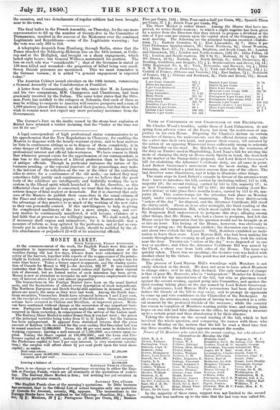A legal corresponded of high professional status communicates to us
his apprehension that the New Regulations in Chancery, for enabling the Masters to dispense with the hourly-warrant system, and to hear matters by lists in continuous sittings so as to dispose of them completely, is in some danger of falling utterly into disuse from obstacles interposed by professional interest and official lukewarmness. We have reason to think that whatever ground exists for the apprehension of our correspondent, is due less to the indisposition of a liberal profession than to the inertia of antique officials. Though in particular instances the nature of the business pending, or the especial juncture of the proceedings, may make it the interest of the solicitors on the one or the other of the contesting sides to strive for a continuance of the old mode,—as indeed they may sometimes fully justify such continuance,—yet we believe that the great body of the solicitors are intelligently and faithfully working the new system in the liberal spirit which launched it. So far, therefore, as this influential class of agents is concerned, we trust that the reform is not in serious danger of fatal neglect or desuetude. But it is observed that only some of the Masters do publish their cause-lists in the usual column of the Times and other morning papers ; a few of the Masters refuse to give the advantage of this practice to so much of the working of the new rules as they can personally eontroL If this unwillingness to help in giving the complicated machinery of the law a more simple, easy, and cer- tain motion be continuously manifested, it will become evidence of a bad faith that at present no one willingly imputes. We shall watch, and if necessary shall expose and animadvert; for it is intolerable that a measure of reform so long agitated by the profession, and at last so eau- fiously put in action by its judicial heads, should be nullified by the ef-
fete attachments or prejudiced of its ministerial officials.


























 Previous page
Previous page